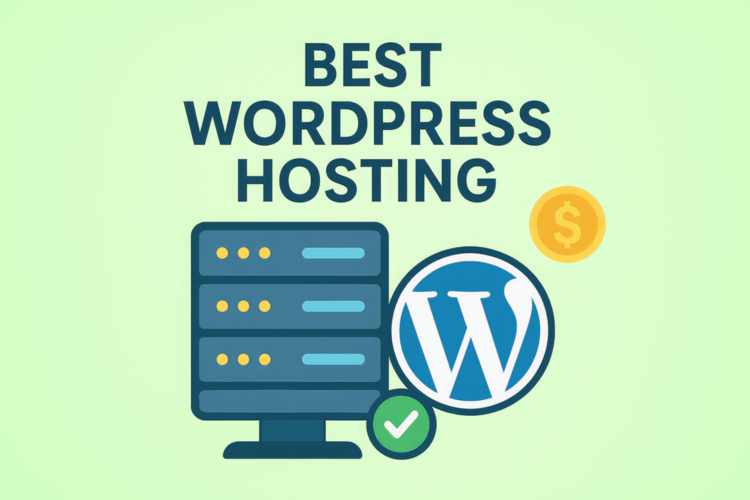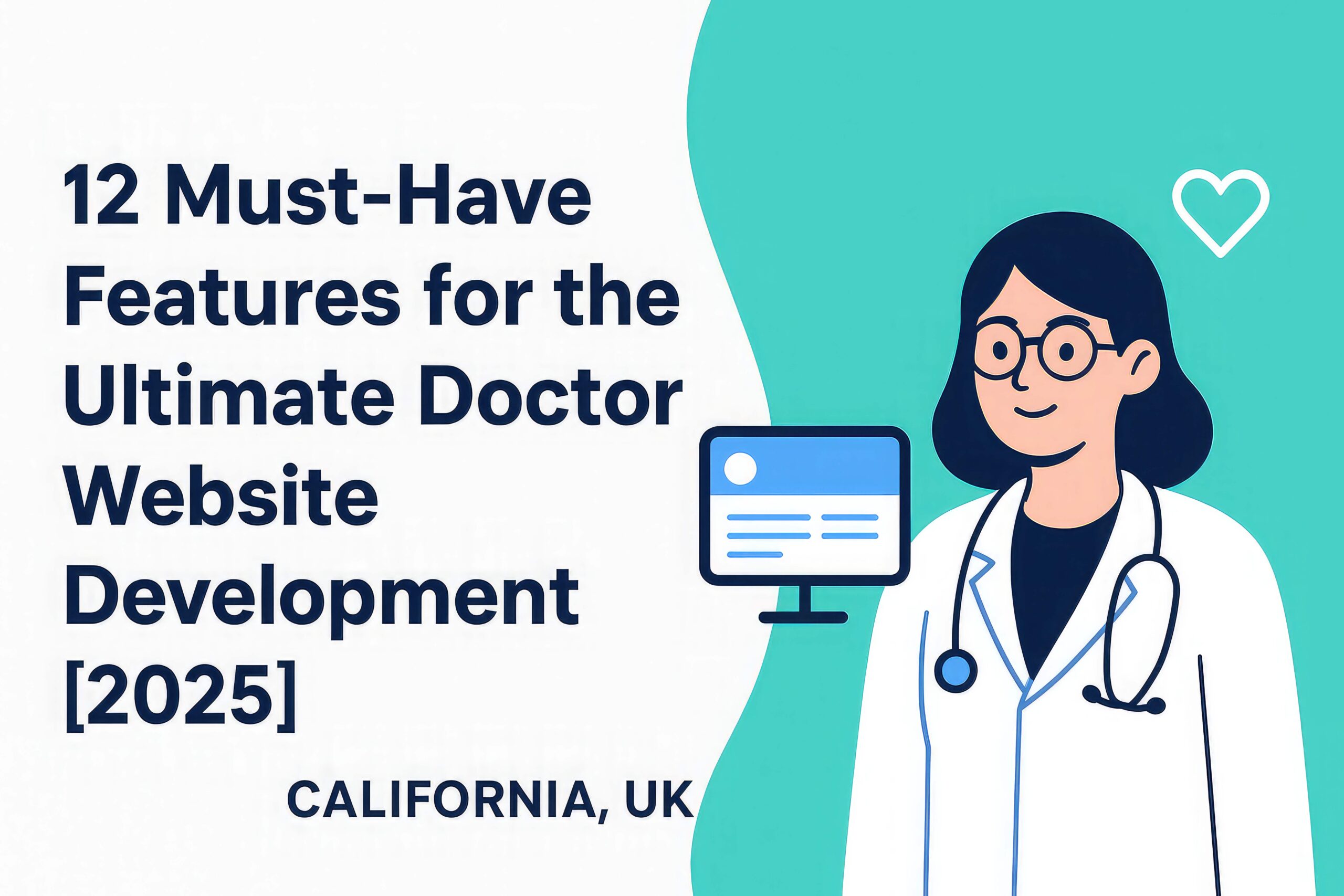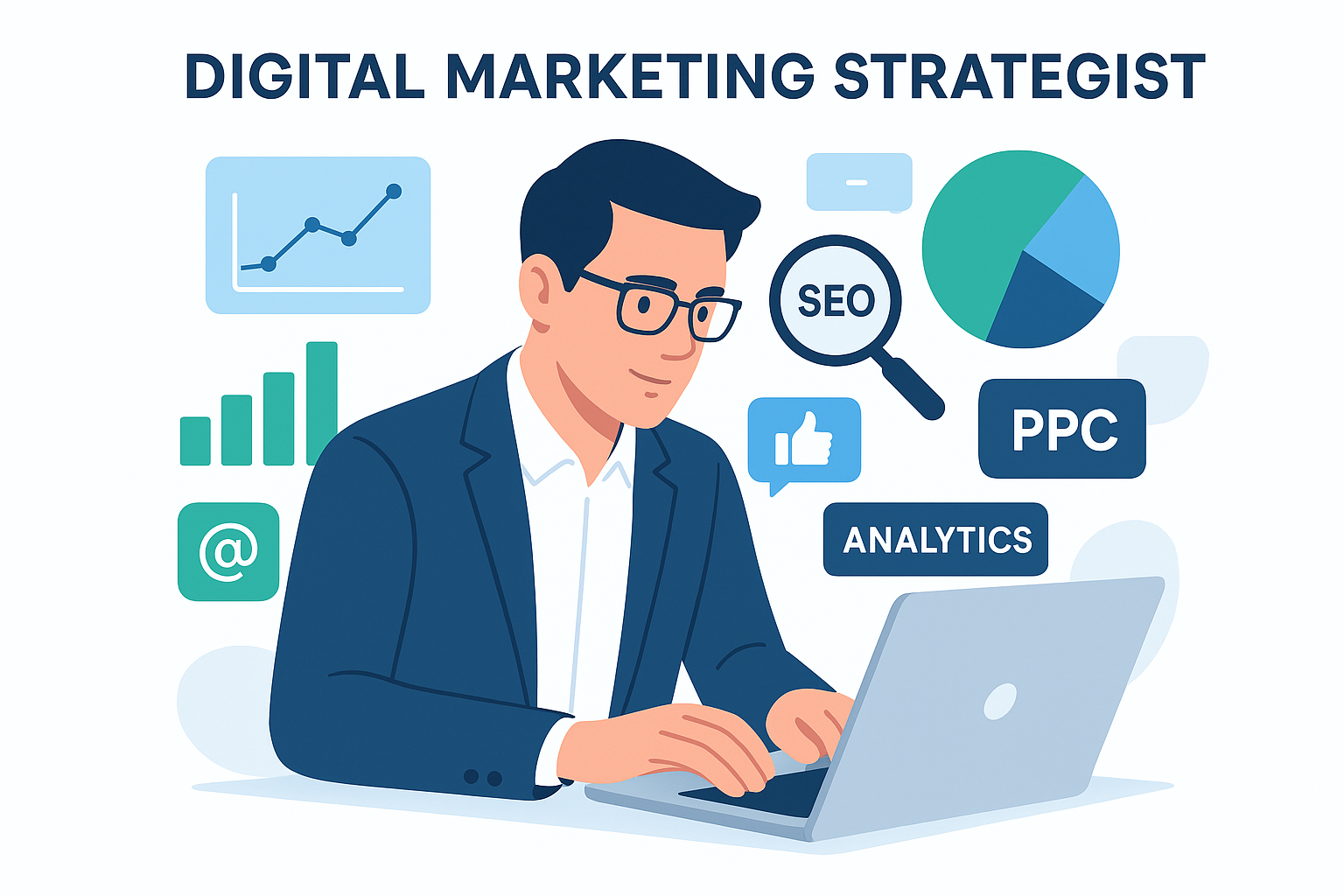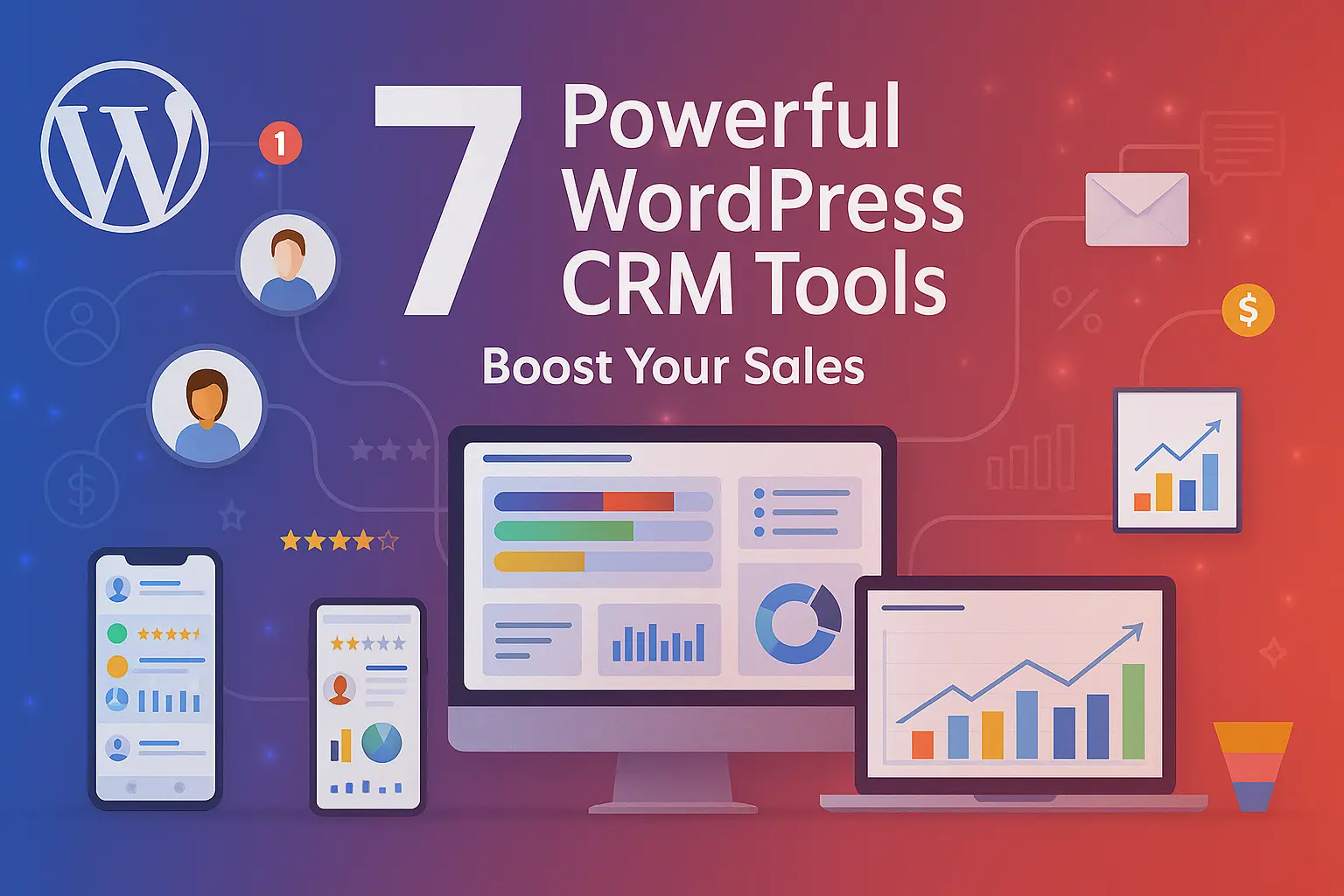In today’s fast-moving, digital-first business world, the role of a digital marketing strategist has never been more valuable. From startups looking to make their mark to global enterprises aiming to stay ahead, every organization needs someone who can connect marketing goals with bigger business objectives.
A strategist isn’t just about running ads or posting on social media — their job is to see the bigger picture, design a roadmap, and make sure every campaign works toward long-term success. In this article, we’ll break down who a digital marketing strategist really is, the responsibilities they handle, the skills they need, and why businesses consider them a vital partner in growth.
A Digital Marketing Strategist is a professional who designs and directs online campaigns to align business goals with digital channels. Their role goes beyond execution — they provide the vision, roadmap, and data-driven strategies for growth.
Key Points:
- Challenges: Cost, time to results, and continuous upskilling.
- What they do: Plan SEO, PPC, social media, and content campaigns to maximize ROI.
- How to become one: Gain certifications (Google, HubSpot), hands-on experience, and build a strong portfolio.
- Essential skills: Analytical thinking, creativity, leadership, adaptability, and tool expertise (Google Analytics, SEMrush, HubSpot).
- Career path: Work in agencies, in-house teams, as consultants, or freelancers with strong earning potential.
- Benefits: Clear direction, brand growth, and performance tracking.
In short, a Digital Marketing Strategist bridges business vision and digital execution, making them critical for long-term online success.

Becoming a digital marketing strategist doesn’t happen overnight. It’s a mix of learning, experimenting, and building credibility over time. Here’s a simple 4-step path you can follow:
If you want to understand how to become a digital marketing strategist, start with a solid knowledge base. A degree in marketing, communications, or business can help, but in today’s world, online certifications and specialized training programs are often more practical. They let you learn the latest strategies and tools without spending years in school.
Theory is good, but nothing beats real-world practice. Many aspiring strategists begin by interning at agencies, helping with campaign management, or taking on freelance projects. These experiences give you the chance to apply what you’ve learned and get a closer look at how consumers behave online.
A big part of becoming a digital marketing strategist is sharpening your skill set. Critical thinking, creativity, adaptability, and data analysis are must-haves. You’ll also need to understand both traditional marketing basics and the latest digital trends and know how to bring them together in campaigns that work.
Companies want proof, not just theory. That’s where a strong portfolio comes in — filled with case studies and examples that highlight your results. At the same time, networking (both online and offline) is key. The right connections often open the doors to new opportunities and collaborations.
A successful career as a digital marketing strategist isn’t just about knowing tools — it’s about having the right mix of creativity, analysis, and communication. Here are the skills that truly set professionals apart:
- Analytical Ability – Turning numbers into insights. A strategist should know how to read data and use it to guide smart decisions
- Creativity – Marketing is also about standing out. Creative thinking helps you design campaigns that capture attention in a crowded digital space
- Technical Expertise – From SEO and PPC to content marketing, understanding how each channel works gives you the edge to build well-rounded strategies
- Communication Skills – You’ll often be explaining your ideas to teams, clients, or leadership. Being clear and confident makes a huge difference
- Adaptability – The digital landscape changes fast. A strategist who can quickly adjust to new trends and platforms stays ahead of the curve
Combined, these skills allow strategists to balance creativity with data-driven thinking, ensuring every campaign has impact and measurable results.
A digital marketing strategist creates a clear direction for a brand’s online presence. Instead of focusing on just one channel, strategists look at the bigger picture — how every campaign, platform, and message works together to achieve business goals.
Often, a digital marketing strategist consultant helps businesses rethink their overall approach, blending creativity with data-backed decisions. Their value lies in seeing the larger vision while ensuring every small tactic contributes to long-term success.
Many business owners wonder: Do we really need a strategist when we already have a marketing team? The answer is simple — a marketing strategist brings clarity, structure, and long-term direction that execution teams alone may not provide.
A strategist helps save time, make the most of budgets, and improve return on investment by ensuring every action ties back to a bigger plan. For startups or small businesses, hiring a freelance digital marketing strategist can be a cost-effective way to access expert guidance without the expense of a full-time hire. Larger companies, on the other hand, often bring in a digital marketing strategist consultant to design specialized campaigns or help them break into new markets.
In short, a strategist ensures your marketing isn’t just busy, it’s purposeful.
Become a Digital Marketing Strategist
Ready to become a successful Digital Marketing Strategist? Download the complete PDF course now
Download PDFOn a day-to-day basis, a digital marketing strategist wears many hats. Their work stretches across different digital touchpoints, making sure every piece of the puzzle fits together. Some of their key responsibilities include:
- Researching audiences and competitors to understand where opportunities lie
- Designing multi-channel marketing campaigns that connect with the right people
- Guiding teams on SEO, paid advertising, and content strategies
- Working closely with writers, designers, and analysts to keep campaigns on track
- Monitoring KPIs and adjusting campaigns to improve results
Some strategists specialize in specific industries, while others focus on local markets by offering local digital marketing strategist services tailored to community needs. Whatever the niche, the ultimate goal is the same: creating strategies that drive measurable growth and impact.
One of the most important responsibilities of a digital marketing strategist is managing campaigns from start to finish. This isn’t just about launching ads — it’s about making sure every part of the campaign is planned, executed, and optimized for success.
Here’s what effective campaign management looks like:
- Planning budgets carefully and allocating resources where they’ll have the biggest impact
- Setting clear, realistic goals and milestones
- Coordinating tasks across teams so everyone stays aligned
- Making adjustments based on data to continuously improve results.
This is also where the difference between a digital marketing strategist and a manager becomes clear. Managers often focus on the day-to-day execution, while strategists create the roadmap and ensure every campaign connects to the larger business goals.
Behind every successful digital marketing strategist is a strong toolkit. The right tools don’t just make work easier — they help strategists track results, find opportunities, and streamline campaigns. Some of the most valuable tools include:
- Google Analytics – Perfect for monitoring website traffic and campaign performance
- SEMrush and Ahrefs – Essential for SEO research, keyword strategy, and competitor analysis
- HubSpot and Mailchimp – Powerful platforms for marketing automation and email campaigns
- Hootsuite or Buffer – Useful for scheduling, managing, and analyzing social media posts
By mastering these tools, strategists can work smarter, make data-driven decisions, and deliver stronger outcomes for businesses.
In a fast-changing digital world, continuous learning is a must. Taking a digital marketing strategist course/certification helps professionals stay updated with the latest tools, platforms, and strategies.
These programs often cover core areas like analytics, paid ads, campaign planning, and marketing automation. Beyond the knowledge, certifications also send a strong signal to employers and clients that you’re committed to growth and professional development.
For aspiring strategists, a certification can open doors to entry-level roles. For experienced professionals, it can sharpen expertise and add credibility when competing for bigger opportunities.
The demand for skilled digital marketing strategists is high — and so is the earning potential. Salaries vary depending on factors like experience, location, and industry, but overall, it’s considered a competitive career path.
Freelancers often set their rates based on their portfolio and client results, which means income can grow quickly if you deliver strong outcomes. Those working in agencies or large organizations usually enjoy stable pay with room for steady growth as they take on bigger responsibilities.
Globally, the salary trend for strategists continues to rise, reflecting how valuable this role has become as businesses prioritize online visibility and digital success.
Real-world examples are the best way to see the impact of a digital marketing strategist. Here are a few case highlights that show how the right strategy can transform results:
- A small business increased its organic traffic by more than 200% after a strategist redesigned their SEO and content plan
- A product launch campaign doubled sales within six months, thanks to a mix of paid ads and influencer collaborations
- A traditional brand successfully rebranded to attract younger audiences by aligning its digital presence with modern trends
These case studies prove that strategists aren’t just planners — they’re problem-solvers who merge data insights with creative thinking to deliver measurable growth.
In such a competitive field, personal branding is no longer optional — it’s essential. For a digital marketing strategist, building a strong personal brand helps attract clients, secure better job offers, and showcase expertise to a wider audience.
This can be done in many ways: writing insightful blogs, speaking at events, engaging on social media, or even sharing success stories from past campaigns. Each effort builds credibility and positions you as a go-to expert in your niche.
By investing in personal branding, strategists don’t just market businesses — they market themselves, creating long-term opportunities and career growth.
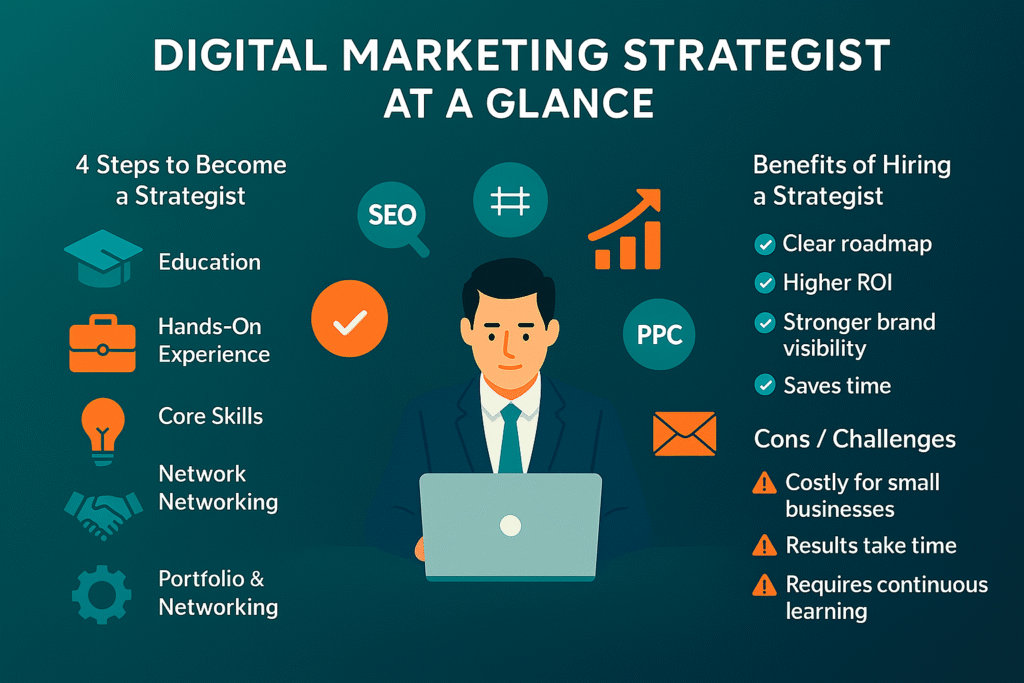
Many people wonder how a digital marketing strategist differs from other roles, like managers or specialists. The difference lies in perspective.
Managers usually focus on execution — making sure tasks are completed on time. Specialists dive deep into one channel, like SEO or social media. But a strategist works at a higher level. They provide vision, set direction, and make sure every marketing effort aligns with the overall brand and business goals.
At this level, strategists aren’t just campaign planners; they’re leaders who guide brand positioning, long-term growth, and consistency across all platforms.
Hiring a digital marketing strategist can bring incredible value to a business — but like any investment, it comes with both advantages and challenges. Here’s a quick comparison to help you weigh the decision:
| Benefits of a Digital Marketing Strategist | Cons / Challenges |
|---|---|
| Provides clear strategic direction across all campaigns | Hiring a full-time strategist can be expensive for small businesses |
| Improves ROI through optimized planning and execution | Results take time and require consistent effort |
| Aligns marketing tactics with overall business goals | Needs continuous upskilling to stay current with digital trends |
| Saves time by guiding teams with a structured roadmap | Smaller companies may struggle to justify the cost |
| Offers expertise across SEO, PPC, social, and content | Risk of over-reliance on one person’s expertise |
| Enhances brand visibility and authority online | Freelancers may lack deep industry-specific knowledge |
| Tracks and analyzes performance for smarter decisions | May need extra resources to fully execute the strategist’s vision |
This balanced view shows why many companies see strategists as essential partners, even if the investment requires careful planning.
What does a digital strategist make?
A digital strategist earns a competitive salary, usually between £35,000 and £55,000 per year in the UK. Senior roles can go above £60,000 annually, while freelancers may charge £30–£80 per hour depending on experience.
What is the role of a marketing strategist?
A marketing strategist creates the big-picture plan that guides all marketing efforts. Their role is to research the market, define target audiences, and design strategies that align with business goals. They ensure every campaign is purposeful, consistent, and focused on long-term growth.
What are the 9 types of digital marketing?
- SEO – Optimizing websites to rank higher in search engines.
- PPC – Paid ads where you pay only when users click.
- Content Marketing – Creating valuable content to attract and engage audiences.
- Social Media Marketing – Promoting brands through social platforms.
- Email Marketing – Sending targeted emails to nurture leads and customers.
- Affiliate Marketing – Partnering with affiliates who earn commission for sales.
- Influencer Marketing – Collaborating with influencers to reach wider audiences.
- Mobile Marketing – Reaching users via apps, SMS, and mobile ads.
- Video Marketing – Using videos to promote, explain, or build brand awareness.
What is the dark sides of digital marketing?
The dark side of digital marketing includes practices and risks that harm users or businesses, such as:
- Ad fraud & scams – fake clicks, bots, or unethical promotions draining budgets.
- Privacy issues – misuse of personal data and tracking without consent.
- Misinformation & fake ads – spreading misleading content to gain clicks.
- Addictive tactics – overuse of algorithms designed to keep users hooked.
- High competition & burnout – businesses under pressure to constantly produce content.
Is digital marketing a good career in the UK?
Yes, digital marketing is a good career in the UK due to high demand, diverse roles, and strong salary growth opportunities. Entry-level salaries start around £25k–£30k, while experienced strategists can earn £45k+. It’s competitive and fast-paced, but offers flexibility and long-term growth.
The journey of a digital marketing strategist is all about balancing strategy with creativity, data with intuition, and vision with execution. From learning how to become a strategist to mastering the right skills and tools, this career path offers endless opportunities for those willing to adapt and grow.
Whether you choose to work as a freelancer, join an agency, or offer local digital marketing strategist services, the role is both dynamic and rewarding. With continuous learning, certifications, and hands-on experience, you can position yourself as a valuable guide for businesses navigating the digital world.
In the end, a strategist isn’t just someone who creates campaigns — they’re the ones who connect every effort to the bigger picture, driving long-term success in an ever-changing digital landscape.

